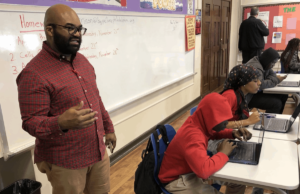Schools that foster innovation
In my first month as superintendent, Tacoma superintendent Rudy Crew told me to send my leadership team to Harvard to visit Tony Wagner. They came back and said, “there’s this guy who sounds like you, but we understand him.” For 15 years Tony has been a mentor and friend. His recent book, The Global Achievement Gap, is an education best seller.
Last night over dinner (which included the world’s best grilled cedar plank salmon and some good wine), we talked about innovation. I told Tony that I was investing in and advocating for education innovators. He asked me what I thought schools would look like that fostered innovation. I told him I’d blog the response.
Five innovator skills come to mind:
· Skilled: innovators almost universally have strong analytical reasoning and communication skills. They can dissect a problem and help others see it more clearly. They understand the value of quality work products—that means a number of people have told them, “No, that’s not good enough.”
· Curious: more difficult to capture is the sense of curiosity–the kind that causes a deep dive on a subject that others might consider obscure. There’s a forward leaning aspect to this attribute; a wondering about what’s around the corner. There’s joy derived from what Expeditionary Learning would call “the having of wonderful ideas.”
· Self directed: innovators have learned to take responsibility for their own learning. Intrinsic rewards are more important than extrinsic (or at least short term extrinsic rewards).
· Persistent: related to the last three, innovators simply work harder than other people. They learn from failure. When bounded by limited time or resources, they find a way to achieve a goal.
I’ve probably missed a few (what would you add?), but you get the gist. It’s easy to build this list than figure out what set of experiences would foster these attributes. Schools like High Tech High are the best current answer to the question. Students work on real world projects, get told, “No, it’s not good enough,” and go on to produce high quality work product. Art and calculus are smashed together (e.g., Calculious), science emerges through applied Humanities, robotics competitions focus team energy, and internships introduce adult world constraints and resources.
Perhaps we could add Outward Bound, business plan competitions, international travel, and online learning games. But it still sounds like a good school with some add ons.
What if students innovate themselves out of school, would we count that as success? The opportunities for independent study are growing exponentially—two million students will be learning online this fall. Even bound by the old credit accumulation system, it’s now possible to construct a very different learning experience. Now that we’re all locking in on ‘all kids college ready,’ will we allow flexible (and innovative) ways for young people to demonstrate that?
I don’t think I’ve fully answered Tony’s question, but this will be a fun question to work on.





Tom Hoffman
Expeditionary learning would give Eleanor Duckworth credit for "the having of wonderful ideas." Don't you have that book?
Allen Young
You are discussing Big Picture Learning schools that, as you are aware, are 60 plus strong, are all across the country.
Students involved in real world learning as well as real word assessment.
Kim Carter
Re "what if students innovate themselves out of school" question. In some ways, they already are, just not effectively. Consider two key points from What Would Google Do? (Jeff Jarvis: http://www.buzzmachine.com/what-would-google-do/): "Give the user control and we will use it. Don't and you will lose us" and "Create and manage abundance rather than control scarcity".
I'm interested in creating a platform that provides: open access to the wide diversity of learning opportunities in any given community (including online); offers (and rates) educators who can "mediate" the learning experience (including connecting learning to standards, coaching, direct teaching, and assessing learning); allows for creating "flash communities of practice" (a la flash mobs, but with learning focus); connects learners with mentors, internships and social networking supports; and facilitates documentation of learning and growth.
Replies
Tom Vander Ark
great point, great concept. key question is extent to which platforms like this play the credit accumulation or GED game or just try get kids what they need/want to learn.
Kim Carter
I'm wondering about the "sweet spot" that perhaps is the intersection of those three (credit accumulation, GED, what kids need/want). Or not.
Conversations with previous students (some grads, some not) points to the critical nature of choice and voice. And an increasing skepticism (and in some cases, cynicism) that either high school diploma or GED really represents anything of value. The key seems to be to start someplace, offer a platform of value and let the community of users then develop it in ways that meet the demands of 21st century learning. (Note: learners and learning then can ultimately become broader than K - 12, or 5 - 21 yrs.)
Two of my largest concerns (at the present moment): 1) Development of social, emotional and civic intelligence. Do these become standards? Might they actually emerge of their own accord? 2) Equity. How to ensure that ALL learners have access and wherewithal to navigate/negotiate the platform develops.